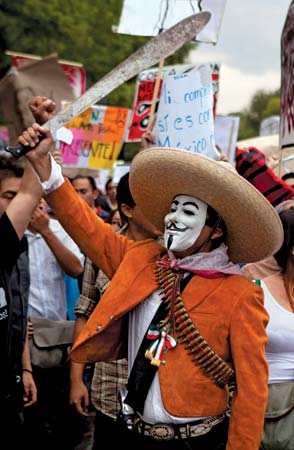The fifth of November,
The Gunpowder treason and plot;
I know of no reason
Why the Gunpowder treason
Should ever be forgot!
--Traditional, circa 17th century
Guy Fawkes Day may just be a day to wear funny masks and shout obscenities to The Man, but it's got a long history for people on both sides of the Atlantic. The recognition of Guy Fawkes Day, Gunpowder Treason Day, Fireworks Day, or V for Vendetta Day has had many purposes over the past four hundred years, on both sides of the issue. While early recognition was solely focused on the fact that Fawkes and his co-conspirators were caught before their dastardly deed could be completed, newer celebrations have taken on all kinds of political and pseudo-political elements.
For many, V for Vendetta--the movie or the graphic novel--is the only true connection they might have to Guy Fawkes Day. This story, set in an alternate reality, is a gritty, dystopic look at a Britain that has been overrun by a corrupt government. V is a violent, vigilante revolutionary (with a flair for the dramatic) out to take down the standing government and let anarchy reign. Guy Fawkes is his cornerstone; not only does he wear a Guy Fawkes mask to shield his identity, but he finds the Fifth of November to be very symbolic. That day has many meanings in V for Vendetta. No matter where you stand, none of them are good.
The mask, which you see in V for Vendetta as a symbol for both the character and his movement, can be seen in several current situations, particularly by members of counter-government movements like Occupy and Hacktivism. It is considered an "internationally popular symbol of protest" according to Britannica online, and has been notably used as far back as the American Revolution (and probably before).
But what is the real history of Guy Fawkes Day?
There are books about it, but for a more concise understanding of the situation, there is plenty of information about the man, the event, and the day of recognition on World Book Online, opens a new window, which we have access to at three reading levels and in multiple languages. We could also have a look at this article, opens a new window via Academic OneFile that starts out with a brief history of the event. It goes on to evaluate its connection to V for Vendetta and modern anarchism--which you can read about if you want to.
World History in Context--one of our favorite browsable resources--can give you a modern take on the experience of Guy Fawkes Day, opens a new window, particularly in Britain. While it is still recognized as the day a Catholic plot to blow up the houses of Parliament and murder the Protestant-run governance (including the King) was foiled, all kinds of other events happen locally for individual communities.
Will you remember the fifth of November?


